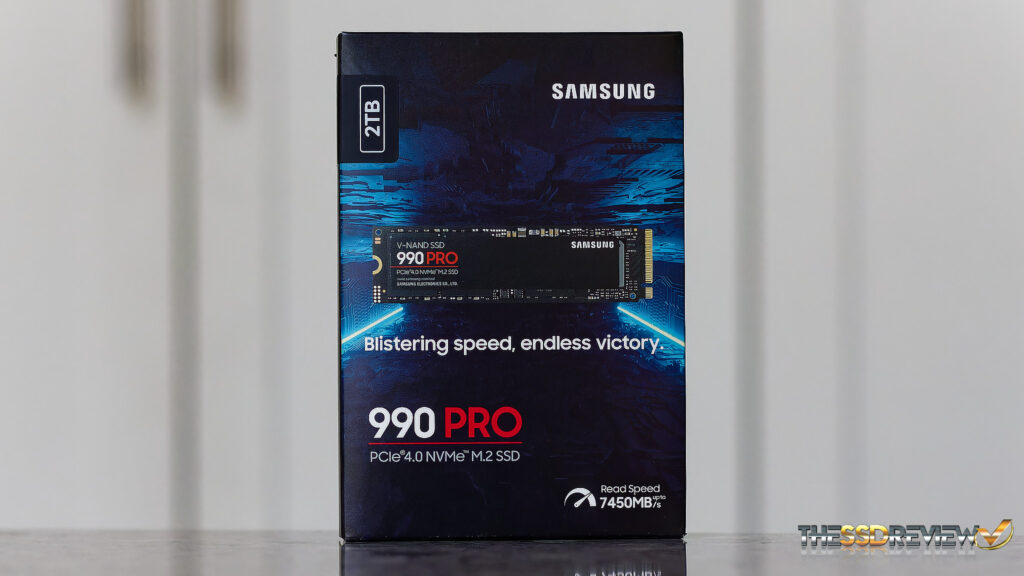One of the oldest players in the SSD world is Samsung. They have been around since the beginning and were the first to release SSDs on the retail side way back in April of 2008, right there beside SanDisk. Back then, we had the Samsung 64GB SLC SATA II SSD priced at a high of $1130… for 64GB! Flash memory has progressed and I am somewhat speechless that The SSD Review has been in this space since that period.
We have witnessed NAND flash memory advance from SLC (single level cell) to MLC multi-level cell), TLC (triple level cell) and then QLC (quad-level cell). Even better yet, the industry seems to have stabilized with manufacturers perfecting what we see in today’s TLC SSDs. We have come to understand that SSD controllers may continue to progress, but memory is the key to end user performance. We think Samsung may have perfected this with their latest 990 Pro Gen 4 NVMe SSD. No surprise here… this SSD is the best we have had in our hands yet and then some.
The Samsung 990 Pro will be available shortly and, well, SK hynix Platinum P41 (review here) take a seat and buckle up as something is about to blow your doors off. The 990 Pro is a PCIe 4.0 four lane (x4) M.2 SSD of the 2280 (22mm wide by 80mm long) form factor and it uses the latest NVMe 2.0 protocol. This SSD lists performance at 7450MB/s read and 6900MB/s write with up to 1550K IOPS and has AES 256-bit full disk encryption, TCG/Opal 2.0 and Encrypted Drive (IEEE1667) data security. These specs don’t begin to tell the 990 Pro story though.
MSRP pricing is expected to be $170 for the 1TB and $290 for the 2TB, with a slight bump of $20 for the heatsink included models. Check Amazon for pricing. This includes a 5-year written warranty with 1.5 million hours MTBF and 600TBW (1TB) and double that for the 2TB capacity.
A close look at this photo above depicts a very thin heatsink, that of which has been specifically designed to fit into the Sony Playstation 5.
On our Test Bench, we have the 2TB version and this is a single sided M.2 SSD containing only two NAND flash memory chips of 1TB each before SSD formatting. Once formatted, there is 1863GB of storage space available to the user.
The Samsung 990 Pro Gen 4 SSD has a proprietary PCIe 4.0 NVMe 8nm controller that goes by the nickname ‘Pascal’ along with a 2GB LPDDR4 memory buffer, 1TB buffer for the 1TB capacity. Next to this we have two chips of Samsung 176-layer TLC NAND flash memory.
 Carry on to the next pages for some rather in-depth testing and comparisons. We think you may be impressed.
Carry on to the next pages for some rather in-depth testing and comparisons. We think you may be impressed.
 The SSD Review The Worlds Dedicated SSD Education and Review Resource |
The SSD Review The Worlds Dedicated SSD Education and Review Resource | 

For the everyday use of an average user, is there any significant difference between Gen 4 NVMe SSD and Gen 5? Is it worth the expected price difference?
For every day use for the average user any SSD would work. There isn’t an expert in the world that can tell the difference in any SSD during typical everyday use.
That is basically same as asking if it is worth to buy pcie 4 gpu over pcie 5 gpu. It really depends on product and your use case. I would argue that you might see some improvement on games using direct storage, but there are a lot of if:s in that. I would also argue that you see noticeable difference on windows startup time if you go for intel optane 905 which is gen 3 vs any pcie 5 currently on the market. That has like 3x higher 4k read performance. Interface just enabled higher transfer speed, you need something on the other end that can actually use the available bandwidth on the other end. 14GB/s is not really worth it if device can do 100MB/s at 4k file size if that is your primary need. Personally I think pcie 5 SSD is waste of money because most use cases require higher small file reads, which are currently somewhere between 50MB/s and 350MB/s. Most SSD:s are below 100MB/s and optane:s were at bit above 300MB/s. Sadly Intel could not market them properly as they have max transfer speed below 3GB/s, while Samsung 990 is above 7GB/s. It is pretty hard for marketing team to say Intel one would be faster on overall use when most people just look at max transfer speed.
100MB random reads? Thats huge speed. Unbelievable